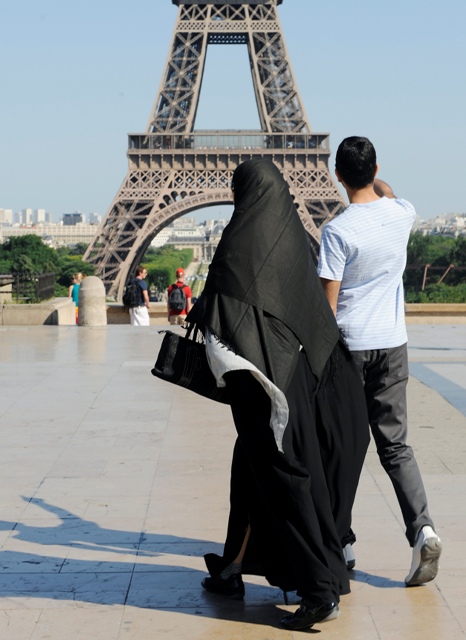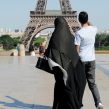
The Afghan Taliban and Al-Qaeda in the Islamic Maghreb Threaten France over Hostility to Burkas
Publication: Terrorism Monitor Volume: 7 Issue: 21
By:

Al-Qaeda in the Islamic Maghreb (AQIM) and Afghanistan’s Taliban strongly condemned French President Sarkozy’s declaration that the burka, a sign of “enslavement” and “debasement,” is “not welcome in the territory of the French Republic” (Aujourd’hui en france, June 19; La Croix, June 19). Both groups reacted swiftly and angrily, castigating Sarkozy’s declaration as yet another example of the Western war against Islam.
President Sarkozy made his statement during a speech before a joint session of the French Parliament on the global economic crisis. Why the president and his advisors decided to weave the burka into a speech on economic policy remains obscure. It may have to do with that the June 9 proposal by 58 representatives, mostly from Sarkozy’s center-right Union pour un Mouvement Populaire (UMP), to open a Parliamentary inquiry to examine the issue and “define counter-measures to curb the wearing of the burka and niqab.” [1] According to the proposal, the burka is degrading and cannot be tolerated in France under the principles of secularism and gender equality.
Both AQIM and the Taliban reacted swiftly and angrily, hyping the threat to Islamic custom and caricaturing its significance in an effort to rally maximum support against the West among Muslims in both Islamic and Western countries.
AQIM’s Amir, Abu Musab Abdul Wadud (a.k.a. Abdelmalek Droukdel), asserted that President Sarkozy’s stance reflects a broader Western hostility toward Islam, characterizing Sarkozy’s statement as “the essence of extremism, racism and the most manifest form of religious terrorism and incitement to religious hatred” (Al-Khabar [Algiers], July 1; As-Ansar.com, June 29). Throughout his communiqué, Wadud used interchangeably the terms “France/French” and “West/Western.” Meanwhile, Taliban spokesman Qari Muhammad Yusuf explicitly accused Western leaders of collusion with President Sarkozy: "In clear and simple words, we must say that Sarkozy’s recent decision is not his own decision. It is not his idea or theory. It is a general decision that all Western officials have adopted to usurp Muslims’ Islamic and human freedoms, to target their social rights and spiritual values. We noticed that no single Western leader or organization has protested against Sarkozy’s recent declarations and attitudes; indeed all of them remained silent in satisfaction” (Sawt al-Jihad, June 29; As-Ansar.com, June 29).
In the same statement, the Taliban claimed banning the burka “is a decision agreed upon and applied by all officials of Western countries to usurp Muslim freedom and Muslim humanity and target their social rights and moral values.” In their zeal to demonstrate collusion between France and the West, both AQIM and the Taliban glossed over the fact that France is the only country that has so far attempted to define the wearing of the burka as being incompatible with national values.
Wadud attempts to play on Muslim fears of greater restrictions on their religion as practiced in the West; "There is no doubt that our Muslim brothers, particularly in France and in Europe in general, are increasingly concerned about the practices of the French politicians and leaders and their harassment against them. Yesterday it was the veil, today it is the burka and tomorrow their dirty hands could be extended to prayer, fasting or pilgrimage.” For Wadud, if Muslims do not feel compelled to defend the burka or the niqab, surely they must not feel compelled to defend prayer or fasting.
The controversy poses two problems for French authorities. The first is a security challenge. The Taliban did not specifically threaten further attacks against France and its interests; however, the presence of more than 3,000 French soldiers in Afghanistan, including combat troops involved in interdiction missions along Afghanistan’s eastern border with Pakistan, offers easy targets for retaliation (see Terrorism Focus, September 2, 2008). Wadud, for his part, spelled out his threat clearly, writing: “We will do everything in our power to avenge our sisters’ and our daughters’ honor, by striking France and its interests, wherever they may be” (As-Ansar.com, June 30). At a time of renewed AQIM activism in Mauritania and Mali as well as Algeria, that threat should be taken seriously.
The second problem is ideological and political. By raising the specter of a possible ban without having a specific policy in mind, Sarkozy has allowed the radicals, whom he presumably wants disempowered, to seize the initiative and mobilize support against the West’s goals in Afghanistan and beyond. Sarkozy’s brief mention of the burka overshadowed several overtures he recently made to the Muslim community. His insistence that “Islam must be recognized in France like any other religion,” his acknowledgement that anti-Muslim discrimination exists and must be confronted, and his belief that the current model of integration does not fulfill its promises for many Muslim youths were completely obscured by the burka controversy.
Possibly anticipating that a strong message condemning the burka might play into the hands of those who argue that the West is at war with Islam, President Sarkozy argued that the burka is not a religious, but a human rights issue. Several Muslim leaders concurred with the French president on this point; Muhammad Moussaoui, president of the Conseil Français du Culte Musulman, and Shaykh Muhammad Sayid Tantawi, Grand Imam of Cairo’s Al-Ahzar Mosque and Grand Shaykh of al-Azhar Univeristy, both agreed that the Quran only requires women to wear a covering over their heads, nothing more (Le Monde, July 2; June 26). However, they also argued that forbidding the burka or the niqab may be counterproductive and contribute to polarizing Muslim and non-Muslim communities in France (Le Nouvel Observateur, June 18).
As things stand now, Sarkozy’s condemnation of the burka has served the radicals’ agenda by allowing them to make their case to a broad audience and to set the terms of the debate. Instead of furthering his vow to address the pitfalls of the current system of integration, Sarkozy has managed only to fuel the radicals’ anti-Western perspective.
Notes:
[1] Assemblée Nationale, Proposition de résolution no.1725 tendant à la création d’une commission d’enquête sur la pratique du port de la burqa ou du niqab sur le territoire national, Paris, June 9, 2009.





